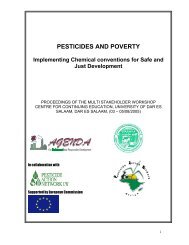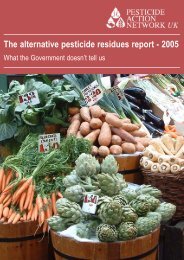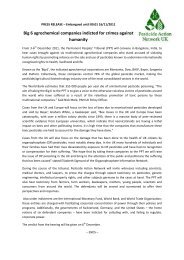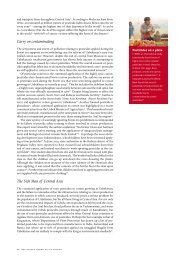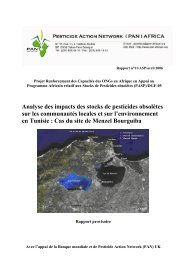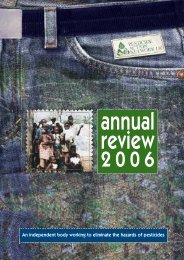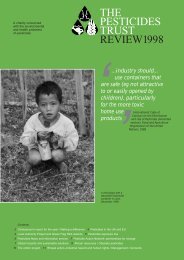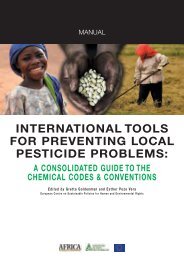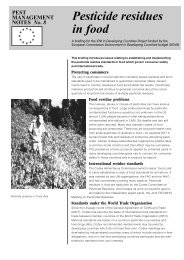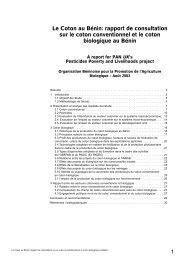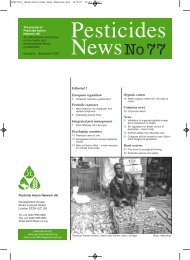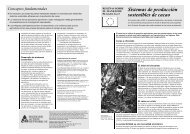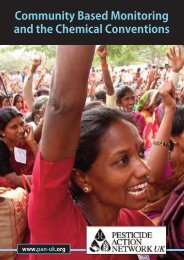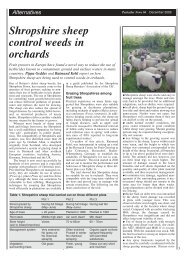Your Daily Poison - Pesticide Action Network UK
Your Daily Poison - Pesticide Action Network UK
Your Daily Poison - Pesticide Action Network UK
You also want an ePaper? Increase the reach of your titles
YUMPU automatically turns print PDFs into web optimized ePapers that Google loves.
Fatality reported<br />
reported to PAN <strong>UK</strong> pursue their complaint<br />
to the stage where it is dealt with by PIAP,<br />
and none of these cases in 2004/2005 was<br />
classified as ‘confirmed’ or ‘likely’.<br />
Between 1 April 2004 and 31 March 2005,<br />
HSE inspectors investigated 150 pesticide<br />
related incidents, see Table 1. This was a<br />
reduction from the previous year’s total of 204.<br />
Fifty five incidents involved allegations of ill<br />
health, seven less than the previous year. The<br />
HSE has acknowledged that under-reporting is<br />
a problem in respect of PIAP, and a loss of<br />
confidence in the scheme may result in fewer<br />
reports.<br />
b. ‘THE HUMAN HEALTH INCIDENTS<br />
SURVEY’: PESTICIDE EXPOSURES AND<br />
POISONINGS REPORTED TO THE PSD BY<br />
COMPANIES<br />
The latest survey by the PSD of incidents<br />
reported by members of the public direct to<br />
pesticide companies (Appendix 4a) indicates a<br />
significant rise in cases of exposure. Reports<br />
have risen from 137 in 2002, to 177 in 2004,<br />
giving a total of 466 incidents reported by<br />
companies in three years. Cases involving<br />
children account for a steady 15 per cent each<br />
year so far.<br />
The low figures for pesticide-related ill-health<br />
PAN <strong>UK</strong> traced details of a fatality listed in the PSD results of 2004. It occurred in<br />
2002 after exposure to aldicarb, but it was not clear whether or not it was related.<br />
The case was publicised across Scotland in the Sunday Herald newspaper 10 : the<br />
following is an extract.<br />
‘An official investigation into whether a young Scottish farm worker was killed by a<br />
highly toxic pesticide had to be abandoned after a university mix-up … Graham<br />
Stephen died on May 3, 2002, after he had applied a dangerous pesticide known as<br />
aldicarb to a potato crop on a farm near Forfar in Tayside. He was 37.<br />
‘After hearing from police that Stephen could have breathed in the pesticide and that<br />
this might have helped cause his death, the procurator fiscal ordered his blood to be<br />
screened for aldicarb. Samples were sent to the forensic science laboratories at the<br />
University of Glasgow, but were accidentally disposed of after six months before<br />
techniques for detecting aldicarb had been developed. The university said the incident<br />
was a ‘regrettable accident’…<br />
‘Aldicarb is one of the most hazardous pesticides still licensed for use on farms in the<br />
<strong>UK</strong>. It was one of the pesticides produced at the chemical plant at Bhopal in India<br />
where an accident in which poisonous gas was released in 1984 killed 8000 people.<br />
Because of the risks aldicarb poses to human health and the environment, the<br />
European Union has severely restricted it, but a ban has been resisted in the <strong>UK</strong> and<br />
other countries, by aldicarb’s multinational manufacturer, Bayer CropScience.’<br />
PAN <strong>UK</strong> comment: companies are required to submit an analytical method as a<br />
condition of licensing to the regulators 11 .<br />
4<br />
reported by the HSE from the PIAP scheme<br />
have been used many times to justify<br />
reassurances by the Advisory Committee on<br />
<strong>Pesticide</strong>s (ACP) to both the public and<br />
Ministers, that these substances are not a<br />
significant public health issue. The ACP is the<br />
expert committee providing advice to Ministers<br />
on pesticides (see appendix 2). But the Human<br />
Health Incidents Survey, first published in<br />
December 2004 6 , instantly doubles the official<br />
figure which for years has been estimated at<br />
‘less than 100 incidents per year’ based on<br />
PIAP data.<br />
The survey was first conducted in 2003 after<br />
PAN <strong>UK</strong> questioned whether or not the<br />
pesticides industry had been complying with a<br />
legal obligation to submit immediately any new<br />
information on the adverse effects of their<br />
products. PSD sent surveys to the companies<br />
but despite several extensions of the deadline,<br />
13 out of 184 companies failed to respond. The<br />
PSD responded by revoking the licences for all<br />
products sold by the non-responding<br />
companies 7 . Revocations of ‘a handful 8 ’ of the<br />
products were subsequently reversed on<br />
receipt of the requested information from the<br />
companies. In the most recent survey, all<br />
companies responded. As with the previous<br />
survey, the PSD has reported results in full on<br />
their website 9 , but this time has withheld<br />
company names.<br />
Examples of exposures reported by the PSD:<br />
◆ Children were playing on a lawn three days<br />
after it was treated with MCPA +<br />
dichloroprop-P + dicamba + ferrous<br />
sulphate. Forty-eight hours later the<br />
children had sickness and diarrhoea.<br />
◆ Two young children were playing on the<br />
lawn treated with MCPA + mecoprop-P +<br />
ferrous sulphate. Both children have<br />
developed a rash on their legs.<br />
◆ A paddock was treated with a product<br />
containing clopyralid and triclopyr. Some<br />
mint was picked from it and used in<br />
cooking potatoes. A girl aged 3 who ate<br />
them was reported ill: she already had<br />
tonsillitis and a temperature.<br />
◆ A woman working as a spray operator who<br />
was three months pregnant contacted the<br />
company to ask if glyphosate could harm<br />
her unborn child. The company doctor<br />
closed the case, reporting ‘there were no<br />
further issues’.<br />
<strong>Your</strong> daily poison



